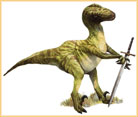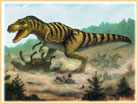Dinosaurs come in many sizes and shapes. Bigger varieties have drab coloration, while smaller dinosaurs have more colorful markings. Most dinosaurs have a pebbly skin texture.
Dinosaurs take full advantage of their size and speed. The swift carnivores stalk prey, staying hidden in cover until they can get into charge range and rush to the attack. Herbivores frequently overrun and trample their opponents.
Deinonychus |
|
4d8+16 (34 hp) |
|
+2 |
|
60 ft. (12 squares) |
|
16 (-1 size, +2 Dex, +5 natural), touch 11, flat-footed 14 |
|
+3/+11 |
|
Talons +6 melee (2d6+4) |
|
Talons +6 melee (2d6+4) and 2 foreclaws +1 melee (1d3+2) and bite +1 melee (2d4+2) |
|
10 ft./5 ft. |
|
Fort +8, Ref +6, Will +2 |
|
Str 19, Dex 15, Con 19, Int 2, Wis 12, Cha 10 |
|
Warm forests |
|
Solitary, pair, or pack (3-6) |
|
3 |
|
None |
|
Always neutral |
|
5-8 HD (Large) |
|
- |
A deinonychus is bright green along its back and flanks, with a much lighter shade of the same color on its underside. The body has darker spots or stripes. Its tail extends straight out behind itself, held aloft by an intricate structure of bony supports, thus allowing its weight to be carried entirely by the back legs. It weighs about 600 pounds.
A deinonychus uses a combination of speed, grasping forearms, large teeth, and hind legs with ripping talons. It hunts by running at prey, leaping, and ripping with its rear talons as it claws and bites. The talons count as one attack. A deinonychus has a relatively large brain for a dinosaur, and its pack hunts with cunning tactics.
Elasmosaurus |
|
10d8+66 (111 hp) |
|
+2 |
|
20 ft. (4 squares), swim 50 ft. |
|
13 (-2 size, +2 Dex, +3 natural), touch 10, flat-footed 11 |
|
+7/+23 |
|
Bite +13 melee (2d8+12) |
|
Bite +13 melee (2d8+12) |
|
15 ft./10 ft. |
|
- |
|
Fort +15, Ref +9, Will +4 |
|
Str 26, Dex 14, Con 22, Int 2, Wis 13, Cha 9 |
|
Dodge, Great Fortitude, Toughness (2) |
|
Warm aquatic |
|
Solitary, pair, or herd (5-8) |
|
7 |
|
None |
|
Always neutral |
|
11-20 HD (Huge); 21-30 HD (Gargantuan) |
|
- |
Though it resides primarily in the water, an elasmosaurus only breathes air. An elasmosaurus has a total length of some 30 feet, including a tail half as long as its entire body, and weighs about 5,000 pounds. Observers who see only its head or tail might easily mistake it for a massive snake.
An elasmosaurus is aggressive and attacks anything it notices. The creature is strong, fast, and highly maneuverable, able to turn quickly and lunge at prey. When hunting, it travels with its head out of the water, snapping down quickly to seize prey.
Megaraptor |
|
8d8+43 (79 hp) |
|
+2 |
|
60 ft. (12 squares) |
|
16 (-2 size, +2 Dex, +6 natural), touch 10, flat-footed 14 |
|
+6/+19 |
|
Talons +9 melee (2d8+5) |
|
Talons +9 melee (2d8+5) and 2 foreclaws +4 melee (1d4+2) and bite +4 melee (2d6+2) |
|
15 ft./10 ft. |
|
Fort +10, Ref +8, Will +4 |
|
Str 21, Dex 15, Con 21, Int 2, Wis 15, Cha 10 |
|
Warm forests |
|
Solitary, pair, or pack (3-6) |
|
6 |
|
None |
|
Always neutral |
|
9-16 HD (Huge); 17-24 HD (Gargantuan) |
|
- |
This creature is a larger version of the deinonychus, standing about 12 feet tall with a total length of 24 feet. It has the same appearance, habits, and abilities of the smaller version.
Triceratops |
|
16d8+124 (196 hp) |
|
-1 |
|
30 ft. (6 squares) |
|
18 (-2 size, -1 Dex, +11 natural), touch 7, flat-footed 18 |
|
+12/+30 |
|
Gore +20 melee (2d8+15) |
|
Gore +20 melee (2d8+15) |
|
15 ft./10 ft. |
|
Powerful charge, trample 2d12+15 |
|
Fort +19, Ref +9, Will +6 |
|
Str 30, Dex 9, Con 25, Int 1, Wis 12, Cha 7 |
|
Temperate plains |
|
Solitary, pair, or herd (5-8) |
|
9 |
|
None |
|
Always neutral |
|
17-32 HD (Huge); 33-48 HD (Gargantuan) |
|
- |
A triceratops has a body about 25 feet long and weighs about 20,000 pounds.
These creatures are likely to charge and skewer any creature of at least Large size that infringes on their territory. A triceratops uses its trample attack on smaller opponents.
Tyrannosaurus |
|
18d8+99 (180 hp) |
|
+1 |
|
40 ft. (8 squares) |
|
14 (-2 size, +1 Dex, +5 natural), touch 9, flat-footed 13 |
|
+13/+30 |
|
Bite +20 melee (3d6+13) |
|
Bite +20 melee (3d6+13) |
|
15 ft./10 ft. |
|
Fort +16, Ref +12, Will +8 |
|
Str 28, Dex 12, Con 21, Int 2, Wis 15, Cha 10 |
|
Alertness, Improved Natural Attack (bite), Run, Toughness (3), Track |
|
Warm plains |
|
Solitary or pair |
|
8 |
|
None |
|
Always neutral |
|
19-36 HD (Huge); 37-54 HD (Gargantuan) |
|
- |
Despite its enormous size and 6-ton weight, a tyrannosaurus is a swift runner. Its head is nearly 6 feet long, and its teeth are from 3 to 6 inches in length. It is slightly more than 30 feet long from nose to tail.
A tyrannosaurus pursues and eats just about anything it sees. Its tactics are simple-charge in and bite.
Improved Grab (Ex): To use this ability, a tyrannosaurus must hit an opponent of up to one size smaller with its bite attack. It can then attempt to start a grapple as a free action without provoking an attack of opportunity. If it wins the grapple check, it establishes a hold and can try to swallow the foe the following round.
Swallow Whole (Ex): A tyrannosaurus can try to swallow a grabbed opponent of up to two sizes smaller by making a successful grapple check. The swallowed creature takes 2d8+8 points of bludgeoning damage and 8 points of acid damage per round from the tyrannosaurus's gizzard. A swallowed creature can cut its way out by using a light slashing or piercing weapon to deal 25 points of damage to the gizzard (AC 12). Once the creature exits, muscular action closes the hole; another swallowed opponent must cut its own way out.
A Huge tyrannosaurus's gizzard can hold 2 Medium, 8 Small, 32 Tiny, or 128 Diminutive or smaller opponents.